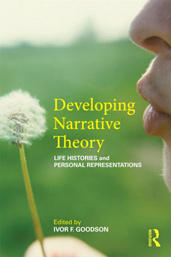Developing Narrative Theory: life histories and personal representation
Narrativity, Learning and Flexibility: towards the narrative future
In the concluding part of this chapter, we look into the future to speculatively view patterns and perspectives as they might impinge on life narratives. In the emerging world of rapid communication and change, where people have to change jobs and partners with greater regularity, the cartography of life narratives will itself no doubt respond and possibly transform existing patterns. Certainly, the self project and associated life narrative would seem to require greater flexibility in the delineation of courses of action and may require what I call ‘re-selfing’ at more regular intervals.
In his final novel, Malcolm Bradbury ruminated on the endless pursuit of selfhood. He writes:
For the truth is that, though the self may be an anxious item, and we are all no more than a face drawn in the sand or on the very edge of the waves in a collapsing cosmos, the self as we’ve invented and pampered it, the private self, the personal self, is a being worthy of treasuring. (Bradbury 2000: 426)
Whilst he ‘invents and pampers’ his self, he is aware of the perilous and precarious nature of the process. He is reminded: ‘How fragile a life is, how we try to hold onto a shape and meaning for it, and yet always finding it’s drifted away’ (ibid.: 411). This is at the heart of the paradox of the pursuit of cohesion and learning which is featured in different ways, but nearly always present, in the various kinds of life narratives we have scrutinized.
Life narratives vary considerably according to historical periods and cultural contexts, and for this reason we have provided examples from a variety of cultures. This had led some to argue that ‘invented and pampered’ self narratives are primarily a function of the late capitalist West. Geertz has, for instance, noted that:
The Western conception of the person as a bounded, unique, more or less integrated motivational and cognitive universe, a dynamic centre of awareness, emotion, judgement and action organised into a distinctive whole and set contractively both against other such wholes and against the social and natural background is... a rather peculiar idea within the context of world cultures. (Geertz, quoted by Lifton 1993: 87)
